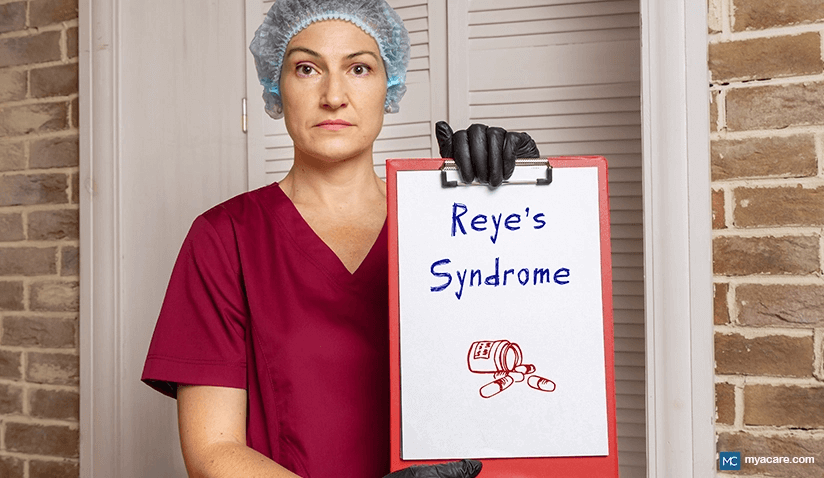Reye’s Syndrome: Know the Symptoms, Causes, and Treatments

Medically Reviewed and Updated by Dr. Rae Osborn, Ph.D. - August 8, 2024
Reye’s syndrome is a life-threatening condition that primarily affects children and teenagers. It is characterized by swelling in the brain and liver that induces sudden severe illness. The disease was first described in 1963 by Dr. R. Douglas Reye, an Australian pathologist.
Studies have revealed a significant connection between aspirin use and the onset of Reye's syndrome, which was more prevalent in the 1970s and 1980s, coinciding with frequent aspirin use in children. It is relatively uncommon nowadays, thanks to public awareness campaigns and medical guidelines discouraging aspirin use in children.
There are an estimated 2 cases per 100,000 children per year. However, the severity of the syndrome cannot be overstated. Reye's syndrome can lead to severe complications such as brain damage, seizures, and liver failure. Fatality occurs in as many as 30-40% of children with the condition due to brainstem dysfunction.
This blog will explore Reye’s syndrome, its symptoms, and why avoiding aspirin use in children can be lifesaving.
What Causes Reye’s Syndrome?
The exact cause is still unknown.
Research has shown a strong link between the use of aspirin, viral infections (such as Varicella or influenza)[1], or liver toxicity and the development of this condition.[2] Reye’s syndrome may also be linked to inherited metabolic disorders.[3]
Why Should We Avoid Giving Children Aspirin?
Aspirin affectsfatty acid oxidation enzymes in mitochondria..
Asprin is an acidic substance that is also known as acetylsalicylic acid. Physically, children and teenagers are less able to cope with the acid stress caused by aspirin. making them more susceptible to aspirin toxicity[4].
When ingested, aspirin can cause a rapid build-up of fatty acids in the liver and brain, leading to fatty degeneration. This build-up and degeneration can cause swelling and damage to these organs, leading to the development of Reye’s syndrome.
How Much Aspirin Can Cause Reye’s Syndrome?
It is unknown how much aspirin can cause Reye’s syndrome but any amount can be dangerous. Studies show that the higher the dose, the higher the risk.
In the past, aspirin lowered a child’s fever during a viral infection and alleviated pain. The combination was likely to be lethal in those susceptible to Reye's Syndrome. Giving aspirin to children and teenagers under the age of 19 should be avoided unless specifically prescribed by a doctor.
These days, there are safer antipyretics for lowering fevers that doctors prescribe in lesser quantities. The American Academy of Pediatrics suggests administering acetaminophen (Tylenol) or ibuprofen (Advil) for pain and fever relief in children.[5]
When administering any medication to children, parents need to avoid overdosing, as it can have severe repercussions.[6]
Viral Infections
Another prime factor to consider is the role of viral infections.
Studies have shown that it is common for children who develop Reye’s syndrome to have a history of viral infections, particularly upper respiratory tract infections. Researchers believe some viral infections can trigger the body’s immune response, leading to increased fatty acid breakdown and a build-up of fatty acids in the liver and brain.
Associated viral infections include:
- Influenza A and B
- Parainfluenza
- Measles
- Varicella (chickenpox)
- Cytomegalovirus
- Epstein-Barr virus
- Adenoviruses
- Coxsackie viruses
- Hepatitis A and B
- Rotavirus
- HIV
Inborn Errors of Metabolism
In some cases, children may have an underlying metabolic disorder that makes them more susceptible to Reye’s syndrome. These disorders, known as fatty acid oxidation disorders, affect the body’s ability to break down fatty acids for energy. Aspirin can exacerbate these disorders, leading to a higher risk of developing Reye’s syndrome.
Medium-chain acyl-CoA dehydrogenase deficiency (MCADD) is an example of a fatty acid oxidation disorder linked to Reye's Syndrome. Children with this inborn error of metabolism are more susceptible to developing the condition after a viral infection or with aspirin use.
Other Potential "Causes"
Several other medications and toxins may mimic the symptoms, yet they are not known to cause Reye's syndrome. These include:
- Hypoglycin from ackee fruit
- Aflatoxin
- Paint-thinner
- Acetaminophen
- Valproic acid
- Outdated tetracycline
- Zidovudine
- Didanosine
- Other herbicides or pesticides
Reye's Syndrome Symptoms and Diagnosis
Reye’s syndrome is a medical emergency that requires immediate attention. Early recognition and prompt diagnosis are crucial for improving the prognosis and minimizing complications.
A diagnosis depends on the inspection of clinical symptoms accompanied by laboratory tests.
The symptoms of Reye’s syndrome can vary, but they usually include[7]:
- Persistent vomiting
- Lethargy or extreme tiredness
- Confusion or disorientation
- Seizures
- Loss of consciousness
- Rapid breathing
- Changes in behavior or personality
- Muscle weakness in the extremities
Reye's syndrome is classified as a two-phase illness:
- It typically begins 3-5 days after a viral infection or a similar collection of symptoms (the prodromal period).
- The first phase consists of vomiting, lethargy, and behavioral changes. These symptoms occur after the prodromal period and can last for several days.
- The second phase, marked by neurological deterioration and liver dysfunction, may last for a few days or weeks.
Doctors stage Reye's syndrome according to the severity of symptoms:
- Stage 1: Vomiting, lethargy, mild liver dysfunction, sleepy
- Stage 2: Restless, delirious or confused, agitated, hyperventilating, hyperreflexia
- Stage 3: Light coma, muscle rigidity
- Stage 4: Deep coma, loss of reflexes, seizures
- Stage 5: Deep coma, seizures, flaccid paralysis, possible respiratory arrest and fatality
If a child presents with these symptoms, a doctor’s first port of call will be to conduct a physical examination and order blood tests to check the child’s liver and brain function.
A lumbar puncture can confirm abnormalities in the cerebrospinal fluid.
EEG to record brain activity.
Imaging tests can assess the brain and spinal cord, further enriching the diagnosis. CT scans or MRIs are common options that can help to rule out other illnesses.
Complications of Reye's Syndrome
As the condition progresses, liver dysfunction and brain damage can lead to lifelong complications, even in cases with a favorable prognosis. These complications may include:
- Neurological Problems: Some children may experience neurological problems, such as learning disabilities, poor temperature regulation, behavioral issues, and cognitive deficits.
- Liver Dysfunction: Liver problems may persist in some children, requiring ongoing monitoring and treatment.
- Fluid Disturbance and Bleeding Disorders: Some may develop excessive gastrointestinal bleeding, hypotension, arrhythmia, intracranial pressure, fluid imbalances, and electrolyte abnormalities.
- Growth Delay: Reye's syndrome may cause stunted growth.
Reye's Syndrome Treatments
The treatment of Reye’s syndrome focuses on reducing the swelling in the brain and liver and preventing further damage with supportive care. Some common strategies include[8]:
- Intravenous fluids to maintain hydration
- Medications that relieve brain swelling and avert seizures
- Monitoring of blood sugar levels and treatment if hypoglycemia occurs
- Ventilation support, if necessary
- Treatment for any underlying viral infections
- Liver support, if necessary, including vitamin K or coagulant administration
- Lowering of ammonia levels, if needed, by medication[9]
In severe cases, the liver becomes severely damaged, and the child may need a liver transplant. Prompt treatment early on can substantially improve the chances of survival.
Prevention
The following measures may help lower the risk of developing Reye's syndrome:
- Vaccinate children against chickenpox and influenza.
- Encourage children and teens to wash hands regularly and follow antiviral precautions.
- Avoid giving aspirin or other salicylates to children and teenagers, especially during viral illnesses. Salicylates extend to bismuth subsalicylate, jasmine tea, and willow bark.
- Use safer fever breakers or pain relief options like acetaminophen or ibuprofen at lower doses.
- Screen newborns for fatty acid oxidation disorders.
- Do not leave toxic substances, such as paint thinner or pesticides, unattended or near children.
- Ensure children drink plenty of water, exercise regularly, and eat healthy.
Takeaways
Reye’s syndrome is a rare, life-threatening condition that can affect children and teenagers. It is characterized by swelling in the brain and liver, which can lead to severe complications. While the exact cause is still unknown, research has shown a strong link between the use of aspirin and the development of this condition. It is vital to avoid giving aspirin to children and teenagers and to use alternative medications for pain and fever relief. Swift detection and early intervention can significantly improve the chances of recovery. If your child is experiencing symptoms of Reye’s syndrome, seek medical attention immediately.
To search for the best pediatric healthcare providers in Germany, India, Malaysia, Singapore, Spain, Thailand, Turkey, the UAE, the UK and The USA, please use the Mya Care Search engine
To search for the best healthcare providers worldwide, please use the Mya Care search engine.
The Mya Care Editorial Team comprises medical doctors and qualified professionals with a background in healthcare, dedicated to delivering trustworthy, evidence-based health content.
Our team draws on authoritative sources, including systematic reviews published in top-tier medical journals, the latest academic and professional books by renowned experts, and official guidelines from authoritative global health organizations. This rigorous process ensures every article reflects current medical standards and is regularly updated to include the latest healthcare insights.

Dr. Rae Osborn has a Ph.D. in Biology from the University of Texas at Arlington. She was a tenured Associate Professor of Biology at Northwestern State University, where she taught many courses to Pre-nursing and Pre-medical students. She has written extensively on medical conditions and healthy lifestyle topics, including nutrition. She is from South Africa but lived and taught in the United States for 18 years.
Sources:
Featured Blogs



